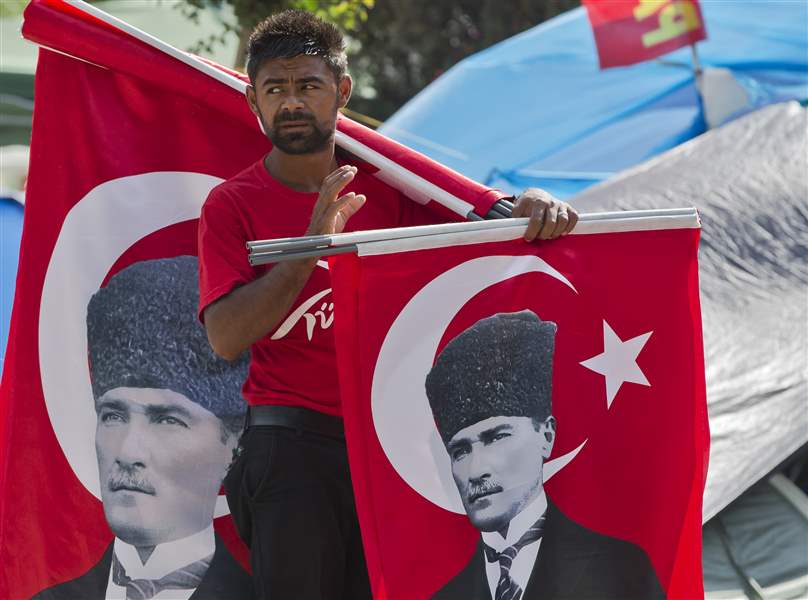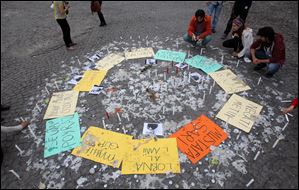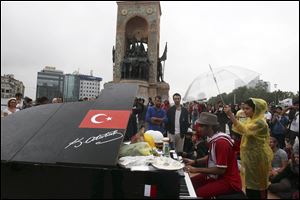
Turkish PM has asked protest representatives to convince those occupying Gezi Park to leave
6/14/2013
A meeting between Turkey's Prime Minister Recep Tayyip Erogan and representatives of anti-government protesters ended early Friday without a clear resolution on how to end the occupation of a central Istanbul park that has become a flashpoint for the largest political crisis of his 10-year rule.
ASSOCIATED PRESS

A meeting between Turkey's Prime Minister Recep Tayyip Erogan and representatives of anti-government protesters ended early Friday without a clear resolution on how to end the occupation of a central Istanbul park that has become a flashpoint for the largest political crisis of his 10-year rule.
ANKARA, Turkey — Turkish Prime Minister Recep Tayyip Erdogan said Friday he has asked a small delegation of protesters to persuade the hundreds of others occupying an Istanbul park to withdraw, hopefully by the end of the day.
Turkish activists leading a sit-in were considering a promise Friday by Erdogan to let the courts — and a potential referendum — decide the fate of an Istanbul park redevelopment project that has sparked Turkey’s biggest protests in decades. The pledge was made during last-ditch negotiations after Erdogan had issued what he called a “final warning” to protesters.
The two-week standoff has damaged Erdogan’s international reputation and led to repeated intervention by riot police. After initially inflaming tensions by dubbing the protesters “terrorists,” the prime minister has moderated his stance in closed-door talks this week.
But Erdogan told party members Friday that the protesters in the park had “stayed long enough.”
“’Go and speak to them ... Don’t let us be forced into reverting to different measures,’” Erdogan said he had told the protesters’ representatives.

A musician plays the piano as a protester holds an umbrella to protect him from the rain under the monument of Mustafa Kemal Ataturk, founder of the modern Turkey, at Taksim Square in Istanbul.
Earlier in the day, Erdogan’s ruling party announced the government would suspend a controversial construction plan for Istanbul’s Gezi Park until courts could rule on its legality. Even if the courts sided with the government, a city referendum would be held to determine the plan’s fate, officials said.
It remained far from clear, however, whether the overture would work.
Erdogan has pledged to end the protest but has also called upon his supporters to rally in Ankara and Istanbul this weekend. Those demonstrations could raise tension between his conservative, Islamic base and those occupying the park, who are mostly — but not all — liberal- and secular-minded — potentially torpedoing his own efforts to end to the showdown.
The park is one of the few green areas left in the sprawling metropolis of Istanbul and many protesters were still seething over the forceful operations by riot police that at times devolved into violent clashes with stone- and firebomb-throwing youths and have killed five people.
Such scenes prompted the European Parliament on Wednesday to condemn the heavy-handed response by Turkish police.
A May 31 police raid to clear out the park ignited demonstrations that morphed into broader protests against what many see as the prime minister’s increasingly authoritarian style of government.

People light candles in victims' memory of recent protests with signs of the names of the dead and wounded demonstrators at Taksim Square in Istanbul.
Erdogan’s opponents have grown increasingly suspicious about what they call a gradual erosion of freedoms and secular Turkish values under his Islamic-rooted party’s government. It has passed new restrictions on alcohol and attempted but dropped a plan to limit women’s access to abortion.
Mobilizing the courts and a referendum, however, could shield the prime minister from accusations of an authoritarian response.
“Until the courts give their final verdicts, no action will be taken regarding Gezi Park,” said Huseyin Celik, a spokesman for Erdogan’s Justice and Development Party, after the meeting. “Even if the court ... is in favor of our government’s decisions, our government will hold a referendum to see what our people think — what they want and don’t want.”
The Taksim Solidarity group, two of whose members were in the meeting with Erdogan, has emerged as the most high-profile from the occupation that began last month. But it does not speak for all of the hundreds camping in the park, many of whom claim no affiliation to any group or party.
Tayfun Kahraman, one of the Taksim Solidarity members who attended the meeting, said he believed Erdogan had offered “positive words,” and that fellow activists would consider them in a “positive manner.” But he said those in Gezi Park would “make their own assessments.”
Suspicion within the park about Erdogan’s tactics and motives remains widespread.
“The prime minister calls the people he pleases to the meetings and says some stuff,” said demonstrator Murat Tan. “We don’t care about them much. Today, we saved the trees here but our main goal is to save the people.”
Analysts say the protests don’t present a threat to Erdogan’s tenure, but threaten his legacy. Some say he has ambitions to enter the history books as a contemporary answer to Mustafa Kemal Ataturk, the founding father of modern Turkey.
Erdogan himself sat in front of a portrait of Ataturk during the overnight talks at his residence in Ankara.